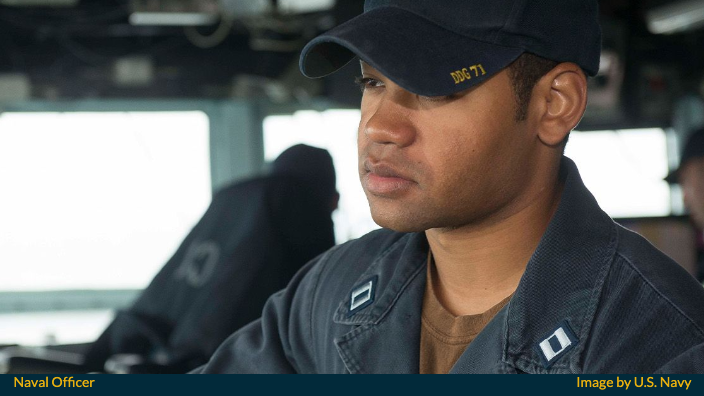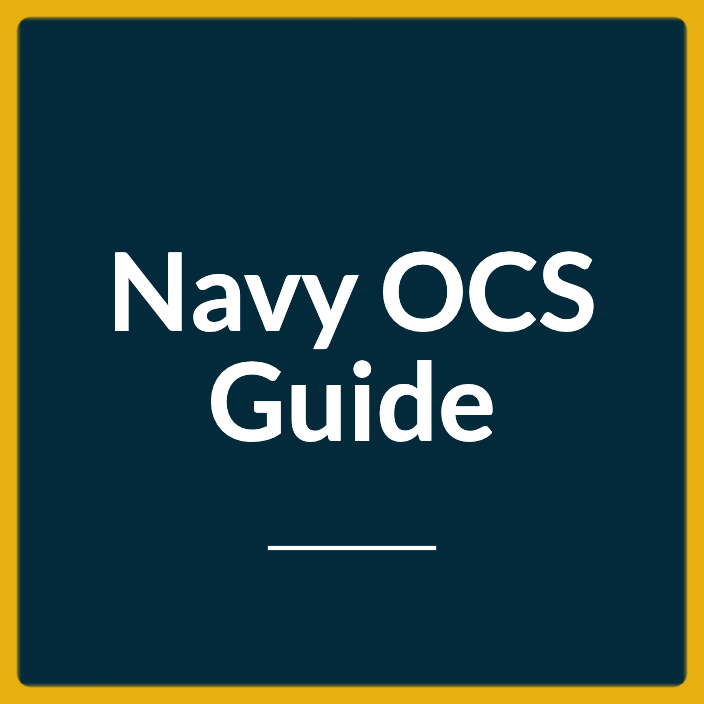Last Updated on September 11, 2023
Being a successful Naval Officer requires more than physical bravery and knowledge. It involves immense responsibility to lead a crew. This causes strength of character, commitment, and leadership ability. The inspiring images of ships sailing oceans and tales of heroic sailors defending their country imply these qualities.
This guide will summarize the qualities necessary for a good Naval Officer, as well as examples of inspiring leaders. Therefore, it is time to begin our exploration of what it takes to become a successful Naval Officer.
Definition of a Good Naval Officer

Naval Officers need to be committed to their country, crew, and mission; possess humility, determination, and a strong moral code; and show a passion for knowledge and accountability.
To be an effective Naval Officer, it is important to have excellent communication skills, the ability to decide quickly and precisely in high-pressure situations, as well as a strong sense of accountability.
Additionally, one must be able to stay composed in difficult circumstances while displaying sound judgment and exemplifying compassion.
Thus, courage, intelligence, resolve, and empathy are necessary for success in the role of a Naval Officer – qualities which can only be attained through hard work and diligent effort.
To become a successful Naval Officer, one must have the right qualities, qualifications, and experience. They must be committed to courage, integrity and selfless service in order to adequately protect their crew and country.
Qualities of a Good Naval Officer
To be a good Naval Officer requires courage, intelligence, commitment and empathy. Success incorporates a passion for learning and a willingness to assume responsibility with integrity. Necessary communication skills enable quick, accurate decision-making under pressure while displaying sound judgment.
Remaining composed and level-headed in challenging situations is essential in combination with showing compassion as a leader.
A Naval Officer should be a symbol of courage, integrity and selfless service. To do this, they must have the required fitness levels, personnel management skills and knowledge about maritime operations.
Additionally, they should have strong leadership capabilities and be aware of the importance of teamwork and morale among their crew.
To be successful as a Naval Officer, one must exhibit determination, dedication and perseverance. These traits cannot be purchased but must be earned through commitment to a nation’s service.
Becoming a successful Naval Officer requires courage, intelligence, commitment, and empathy. This profession is an honor and demands dedication to one’s country. Those who are interested in pursuing this profession should develop their leadership skills.
Leadership Skills
Leadership skills are paramount for any Naval Officer. Leaders must be able to inspire, direct and encourage their crew in order to successfully complete their mission.
Excellent decision-maker skills, critical thinking and the capacity to remain under pressure are essential. Furthermore, good communication is necessary to give orders, offer guidance and suggest ways of working together more efficiently.
A good leader should display fairness when delegating tasks and assessing performance. They should be accessible to hear out the ideas and concerns of their crew members. Leaders should also be willing to embrace risks when applicable, but also be consistent yet understanding when disciplining employees.
A successful Naval Officer exhibits qualities like honesty, integrity, loyalty and respect towards both higher and lower ranks in order to gain the respect of their peers.
Leadership is an important factor for Naval Officers to achieve success. It includes inspiring trust and confidence through determination and dedication. With the right combination, anyone can become a powerful leader.
Moral Character
Having a strong moral character is an important attribute for any Naval Officer, as it enables them to stay true to their principles and values, and command the respect of their crew. Without this trait, officers may struggle to succeed in their mission.
Here’s another way to look at it. A demonstrated lack of good moral character is a disqualifying factor for Navy Officer candidates.
Naval Officers should ensure that they adhere to firm moral codes. This involves avoiding discriminatory or preferential behaviors, telling the truth in difficult situations, and owning up to mistakes instead of attempting to conceal them.
Leaders should possess empathy and compassion for their crew members. By attending to different perspectives, informed decisions that benefit all can be made.
Additionally, strong moral character entails the courage to support what is correct even if it comes with risk or unpopularity – a quality that many successful leaders have reflected in history.
It is essential for a Naval Officer to possess moral character for successful service. Establishing a set of core values ensures officers will act with integrity and honor, which can be beneficial even after their service has concluded.
Honor
Honor is an important attribute for Naval Officers. Being honorable involves exercising integrity and behaving ethically, regardless of the situation. This has been exemplified by influential leaders throughout history, who showed bravery in doing what is righteous despite its difficulty or unpopularity.
Maintaining honor implies refraining from discriminatory and preferential treatment, being honest in difficult circumstances, and accepting responsibility for any errors – instead of trying to assign the blame elsewhere or conceal them. To gain and keep respect from other crew members, following a code of honor is essential. In addition, having such values will be helpful in achieving mission objectives.
Being honorable enables Naval Officers to remain responsible for their choices, maintain respect for others when deciding, and cultivate loyalty amongst their crew. Additionally, officers can act as a role model for the rest of their team by upholding their beliefs.
Having a sense of honor is an important characteristic for any Naval Officer to possess, as it allows them to gain the trust and respect of their crew, which will be useful even after their service has ended.
Selfless Service
Selfless service is an essential quality of any Naval Officer for success. It involves dedication and courage to help others without a thought of reward. This can include making sacrifices in personal needs or desires for the benefit of mission, people, or country. Naval Officers show selfless service through their decisions and actions, always putting the needs of those they are serving before their own.
Selfless service involves humility and respect for others. Naval Officers recognize that a variety of perspectives and experiences can bring success to a mission. All individuals are treated with dignity, regardless of rank. By operating in this manner, an officer can both earn the loyalty of their crew and the trust of those in positions of authority.
Selfless service causes dedicating oneself to quality performance in all areas of life. This includes tackling each task with vigor, viewing it as an opportunity for growth rather than a burden – an approach that will uplift morale among personnel and facilitate successful operations.
Selfless service is an important quality for Naval Officers, allowing them to prioritize the needs of their crew and instilling loyalty. This skill will be beneficial even after leaving service.
Courage
Successful Naval Officers require courage to effectively manage danger and to handle difficult situations. Courage involves physical bravery and mental strength, enabling Naval Officers to make hard decisions and take risks when necessary.
Naval Officers display courage through their convictions and principle, often taking risks for the greater mission success or to safeguard those in their service even if there may be repercussions. They show resilience in learning from failure and developing themselves both professionally and mentally.
Courage involves having compassion and empathy for others. Naval Officers should know the challenges faced by others and be ready to offer help to expect nothing in return. This can foster trust and loyalty amongst crew members and leaders.
Naval Officers need courage in order to succeed. This trait is essential for overcoming challenges, displaying loyalty towards other members of the crew, and having a positive impact on their future after leaving the service.
Winning Mindset
Naval Officers must have a firm belief in their abilities in order to have success in any venture, and especially within the military. This confidence allows them to accept risks and tackle obstacles that may come their way.
Having a positive attitude can be beneficial to foster creativity and innovation. Naval Officers who have a mindset that focuses on success are more likely to suggest innovative solutions. They will be open to trying different strategies and engaging with out-of-the-box thinking in order to achieve their goals.
Resilience is an important component of a winning mindset. In order to succeed, Naval Officers must be able to bounce back from failure and disappointment and maintain faith in their abilities without being inhibited by fear or doubt.
Having a positive attitude is essential for Naval Officers to succeed. It includes having confidence, being determined in the face of challenges, and using creativity to achieve desired aims.
Commitment
A Naval Officer must show commitment and dedication to their duties, as this is essential for success in the navy.
A committed Naval Officer’s dedication allows them to remain focused on their objectives, allowing them to maintain clarity in decision-making, and enabling quick reaction times in high-pressure scenarios.
An officer with commitment will prioritize the needs of their team. They recognize that individual achievement is secondary to collective success. Cooperating with one another towards shared goals strengthens the connections between colleagues, which can only be attained through commitment from all parties.
An effective Naval Officer is one who has dedication and a defined purpose to their job. They understand the need for commitment in order to succeed and will put forth the effort required to fulfill their responsibilities with success and excellence.
Examples of Naval Leaders and Their Inspirational Stories
The United States Navy has included many inspiring figures, such as Admiral Chester W. Nimitz and Captain Joshua Slocum, whose bravery and leadership showed the qualities necessary for naval service.
Admiral Nimitz was a US fleet admiral who served during WW2 and helped guide Allied forces to victory over Japan in the Pacific Theater, hence gaining him the nickname “The Father of Modern Naval Tactics”.
Captain Joshua Slocum was an American mariner who completed a journey around the world solo. His travels lasted three years and one month, during which he experienced many storms and difficult seas.
Following his successful completion of the mission, Slocum published Sailing Around The World, a book detailing his experiences which became a popular bestseller.
Grace Hopper was a Rear Admiral in the United States Navy and a computer scientist whose contributions revolutionized modern computing technology.
Her work included advocating for new programming languages such as COBOL, which enabled computers to be programmed with instructions that were more understandable and easier to use than complex coding words. This paved the way for the development of current computer systems.
Naval leaders throughout history have exhibited various qualities that aspiring Naval Officers may aspire to develop in themselves. Their courage, determination and commitment remind us that success is possible through sustained effort towards one’s goals.
Admiral Nimitz, Captain Slocum, and Rear Admiral Hopper were successful Naval Officers who showed courage and determination in their careers.
They serve as examples for those hoping to join the United States Navy, showing that hard work and dedication can lead to success. We will now look at John Paul Jones, a noteworthy American naval commander from the Revolutionary War era.
John Paul Jones
John Paul Jones was a renowned American naval commander during the Revolutionary War. He steered his undersized warship, the Bonhomme Richard, in risky assaults against the British Navy, despite being outnumbered and overpowered.
He bravely declined to capitulate and was triumphant in this remarkable battle. This heroic feat gained him recognition from both sides of the conflict and made him one of America’s most highly acclaimed naval heroes.
John Paul Jones, a leader, exhibited many characteristics of an admirable Naval Officer. He was courageous, persistent and dedicated to fulfilling his goals regardless of the challenges presented.
Additionally, he showed remarkable composure when selecting tactics under hostile fire – a valuable skill for any naval career.
John Paul Jones is remembered today as an inspirational figure to those in the naval field. His story exemplifies courage and dedication, emphasizing that great feats can be accomplished through hard work and perseverance.
John F. Kennedy
John F. Kennedy was a brave and visionary man. After his naval service in World War II, he went into politics and eventually reached the highest political office as President of the United States. His memory is honored by his stances on social issues, civil rights, and international peace.
During his presidency, John F. Kennedy showed a high level of commitment to his causes. He responded to a variety of challenges, including the Cuban Missile Crisis and the Space Race, with composure and grit while aiming for increased inter-nation dialogue.
During his time in office, John F. Kennedy dedicated himself to public service on a global scale, advocating for disarmament initiatives and global aid relief. His belief in fundamental human rights was a groundbreaking concept.
John Kennedy was an inspirational leader who faced adversity at home and abroad and strove for excellence. His courage, determination and sense of justice are qualities that present-day Naval Officers can draw inspiration from.

